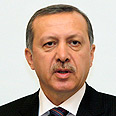
Let’s be responsible adults
Op-ed: Crude Turkish conduct calls for firm but wise diplomatic response by Israel
Those who thought that the flotilla affair is behind us, and that our ties with Turkey will be restored slowly and quietly with the passage of time, sustained a metaphorical slap to the face from Turkey’s president.
Abdullah Gul not only refused to meet his Israeli counterpart, Shimon Peres, after the latter did not agree – and rightfully so – to apologize for the flotilla incident, he also made a belligerent statement whereby in the past, such conduct by Israel would have constituted a casus belli.
Meanwhile, the Turkish president dedicated the time he refused to grant Peres to another president - Mahmoud Ahmadinejad. That was a blunt hint, and also the opening shot for a serious of impassioned, insulted statements on our part, showing an attitude of “what do these anti-Semitic Turks want, we shall no longer go there on vacations.”
Many Israelis were also disappointed by the results of the referendum held in Turkey last month, and the fact that the Turkish people supported a process of undermining the powers of the army, considered the “watchdog of secular democracy.” Suddenly, all of us became experts on domestic processes sweeping this giant state and identified them as another indication for the need to eulogy our ties with it.
But I suggest that we hold back the tears a little longer.
Indeed, Turkey has become increasingly more religious in the past 10 years. Today, it is home to some 85,000 active mosques, one for every 830 citizens (the world’s largest number of mosques per capita.) Sunni Islam studies are mandatory at public schools today, contradicting rulings by the European human rights court and by Turkey’s own Supreme Court. Yet does Turkey’s Islamization necessarily express radicalization?
The Turkish public’s reaction to the secular rule, which has been premised on the military and Supreme Court since Ataturk’s days, should not mislead us. Islam in Turkey is more popular and powerful than ever, yet religious clerics in the country are at times much more moderate than its political leaders.
The most influential religious leader in Turkey, Imam Fethullah Gulen (the spiritual father of Prime Minister Erdogan,) was among the only people who dared to openly speak out against flotilla organizers, arguing that “they challenged the Israeli government, and it was clear that would lead to a bad place.” When Erdogan’s deputy Bulent Arinc (a harsh critic of Israel) was asked about it, he was forced to swallow his pride and admit that “Gulen speaks the truth, as always.”
We must respect ourselves
In any case, the important question isn’t whether Turkey is more Muslim. It is indeed more Muslim, but the important question is as follows: What kind of Islam is it, and how does it approach Israel? We should stop conducting ourselves in line with polar worldviews such as “A secular Turkey is a friend of Israel, while an Islamic Turkey is Israel’s enemy.” For the time being, there is no connection between Turkish Islam and anti-Israeli sentiment. Let’s not create such a link with our own hands (and mouths.)
The answer to this question is much more complex than such simplistic formulae. In recent years, our relationship with Turkey has indeed become more challenging – yet the rumors of its death are premature, and certainly being made rashly and hastily.
Even at the height of the most difficult, bluntest statements on the Turkish side, Erdogan’s government kept on offering to serve as mediator between Israel and Syria. This is not the conduct of someone who wishes to sever ties.
While lashing out against Israel, Turkey indeed moved closer to radical Arab states and to Iran, yet it may lose its place as a central elements among enlightened nations, jeopardize its alliance with the US, and possibly also its dream of joining the European Union. Turkey is walking a thin line here, and it’s very important that we don’t push it to the wrong side.
The message we need to convey is complex and requires plenty of diplomatic wisdom, of the type we do not always excel at. On the one hand, we should put an end to hysterical statements about ending our ties along with the childish declarations about boycotting Turkey vacations. On the other hand, we should not ingratiate ourselves to Turkey and should not show restraint in the face of crude conduct and statements by current Turkish leaders, headed by Erdogan and Gul.
Israel’s president is not supposed to sit at the Davos conference while sustaining curses from Turkey’s prime minister and saying nothing, or show restraint in the face of insults by President Gul. In the region we inhabit, only those who respect themselves garner the respect of others.
So what should we do? The time has come for clear, public statements by leaders of both countries that will remind the Turks of the depth and firmness of the ties, yet in the same breath make it clear to them what is unacceptable for us, and what Turkey may lose in the international theater as result of its crude, provocative conduct. So the Turks decided to become unruly? The role of being the responsible adult has been shifted to us.
Eli Avidar, chairman of the Smart Middle East forum, is a former Foreign Ministry official
- Follow Ynetnews on Facebook










